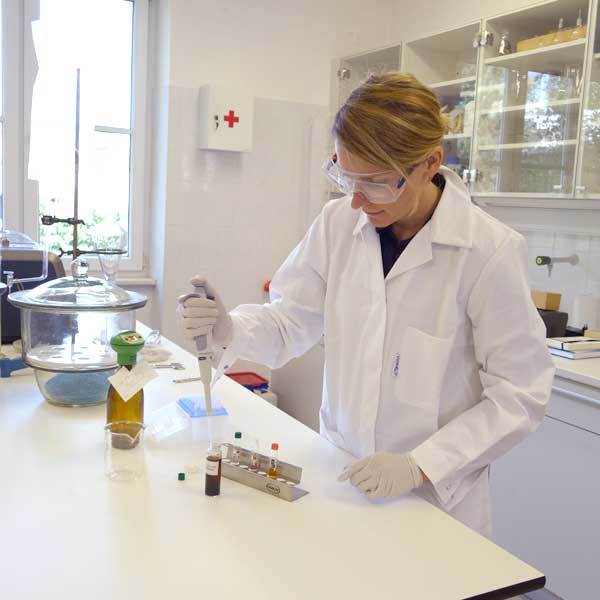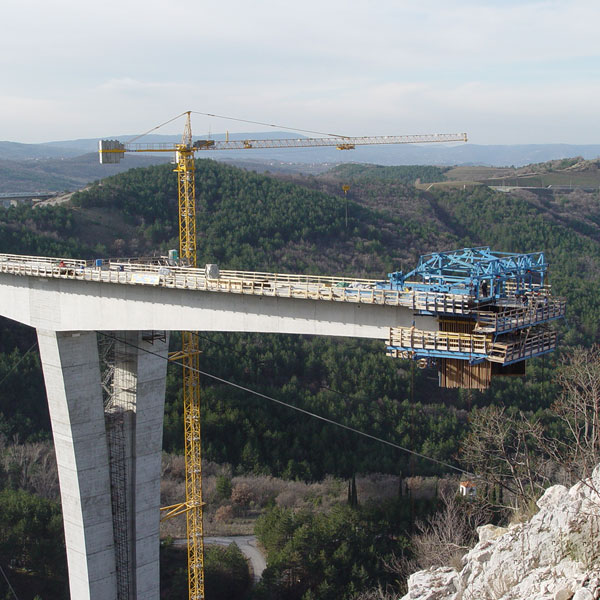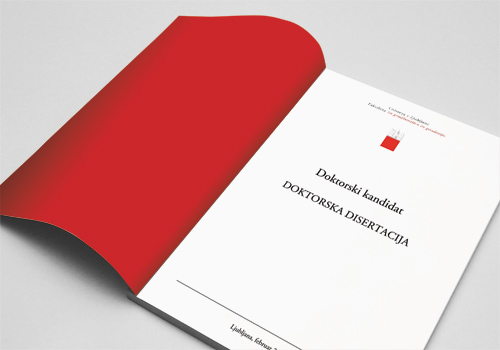
3rd Cycle: Built Environment (PhD)
The basic goal of the doctoral study program Built Environment is education of the highest qualified professionals in individual scientific areas included in the study program. After the studies, graduates are capable of scientific thinking and solving of scientific problems as well as cooperation in solving demanding practical problems with interdisciplinary approach. They are capable of creative and independent scientific and research work and solving of scientific problems for future employers. They are capable to approach a research problem by using the latest scientific methods, to critically assess research results, develop new scientific methods and transfer new technologies and knowledge into practice.
The doctoral study program leads to the scientific title doktor znanosti (Doctor of Science – PhD).
places for doctoral study program Built Environment
Basic goals of the programme
- Civil Engineering,
- Geodesy,
- Spatial Planning and Land Management, and
- Geology.
The goal of the programme is to qualify graduates for scientific way of thinking and solving scientific problems, as well as for cooperation in solving demanding practical problems with interdisciplinary approach.
General competences
Graduates from the doctoral study will be capable of creative and independent scientific research work and of solving demanding problems for future employers. They will be qualified to approach problems in scientific way by using the latest scientific methods, to critically assess the research results, to develop new research methods and to transfer new technologies and knowledge into practice.
Course-related specific competences acquired through the programme
The doctoral students receive in-depth basic knowledge from different areas, and are qualified to research and solve demanding expert problems and acquire knowledge related to scientific methods and procedures. They are qualified to understand and give critical opinion on solving some demanding and complex scientific and research issues.
Additional subject-specific competences can be seen in individual course syllabi for each course.
Conditions for enrolment and selection criteria when enrolment is restricted
- Second cycle study programmes,
- Study programmes leading to professions, regulated by directives of the European Union, evaluated by 300 credit points, or other unified master study programmes evaluated by 300 credit points.
- Prior study programmes leading to specialisation, who previously finished the professional bachelor degree programmes; individual additional programme for such graduates in the scope up to 60 ECTS can be defined by the Study Board of the UL FGG doctoral study,
- Prior study programmes leading to the title master of science or specialisation after the study programme leading to the university degree from the area of technical and natural sciences (for the area of land management and spatial planning also social sciences); candidates are acknowledged prior study obligations in the scope of 60 ECTS,
- Prior study programmes leading to the university education adopted before 11/06/2004.
The doctoral study programme Built Environment is also available for the enrolment of students from other international universities. Assessment of adequacy of prior education abroad is established in the procedure of acknowledgement of foreign education according to Article 121 of the University Statute.
The intake number is 20. In case of restricted enrolment the selection of candidates is based on:
- average grade of study (15%)
- evaluation of diploma or master thesis (5%), and
- success from elective course (80%), consisting of written exam from the area of natural sciences and engineering. Candidates can replace 40% of the grade with a grade from prior scientific and professional work in the area of the study programme.
The main criteria for scientific work are publications, e.g.:
- scientific monograph,
- independent scientific essay in a monograph,
- original scientific articles in journals with impact factor (JCR) or in journals indexed in data bases SCI, SSCI or A&HC
The main criteria for professional work are:
- professional monograph or review,
- independent professional essay in a monograph,
- published professional paper in conference,
- professional articles and/or reviews of articles,
- editorship of monograph or journal, and
- other forms of documented professional activity
Criteria for recognising knowledge and skills acquired before enrolment in the programme
For the acknowledgement of such knowledge and skills the following shall be considered:
- professional specialisation,
- diploma from another higher education institute,
- prior scientific and research work,
- published scientific works,
- expert qualifications, or
- adequate work experiences.
Conditions for progression through the programme
Candidates may enrol to the 3rd year of the doctoral study, if they complete all study obligations of organised study activities from the 1st and 2nd years and upon consent of the University Senate to the theme of the doctoral thesis.
The last, third year, is intended to individual research work and elaboration and defence of doctoral thesis.

Conditions for transitions through programmes
Implementation method of the study
Study programme syllabus with credit points according to ECTS
- 10 ECTS: obligatory common course (Tools and methods in research of built environment),
- 10 ECTS: obligatory course from scientific area (for the areas Geodesy and Spatial Planning and Land Management),
- 15 ECTS: elective courses (for the areas Geodesy and Spatial Planning and Land Management),
- 25 ECTS: individual research work (for the areas Civil Engineering and Geology),
- 25 ECTS: individual research work (obligatory for all research areas).
2nd year:
- 10 ECTS: elective courses,
- 5 ECTS: elaboration and presentation of doctoral theme,
- 45 ECTS: individual research work
3rd year:
- 50 ECTS: individual research work,
- 5 ECTS: presentation of doctoral thesis before public defence,
- 5 ECTS: elaboration and public defence of doctoral thesis.
Scientific area Civil Engineering:
Doctoral students from the area of Civil Engineering select courses totalling 35 ECTS (generally 25 ECTS in the first and 10 ECTS in the second year). They select minimum four courses (3 × 10 ECTS and 1 × 5 ECTS) and maximum five courses (2 × 10 ECTS and 3 × 5 ECTS). They can select them at UL FGG or outside UL FGG, with at least one course of at least 5 ECTS outside UL FGG. Students select elective courses in agreement with their supervisors, taking into account to the area of their research work, however not more than two courses of the same course coordinator.
Scientific area Geodesy:
Apart from obligatory courses, students select courses totalling 25 ECTS (generally 15 ECTS in the first and 10 ECTS in the second year). They select minimum three courses (2 × 10 ECTS and 1 × 5 ECTS) and maximum four courses (1 × 10 ECTS and 3 × 5 ECTS). They can select them at UL FGG or outside UL FGG, with at least one course of at least 5 ECTS outside UL FGG. Students select elective courses in agreement with their supervisors, taking into account the area of their research work, however not more than two courses of the same course coordinator.
Scientific area Spatial Planning and Land Management:
Apart from obligatory courses, students select courses totalling 25 ECTS (generally 15 ECTS in the first and 10 ECTS in the second year). They can select minimum three courses (2 × 10 ECTS and × 5 ECTS) and maximum four courses (1 × 10 ECTS and 3 × 5 ECTS). They can select them at UL FGG or outside UL FGG, however not more than two courses of the same course coordinator, with at least one course of minimum 5 ECTS outside UL FGG. Students select courses in agreement with their supervisors and with regard to the research work of their interest. Additionally, they must consider the following:
- students with diploma from a technical faculty are required to select one elective course from social sciences and one elective course from natural sciences (accounting to 5 to 10 ECTS);
- students with diploma from social sciences faculties are required to select one elective course from technical and another one from natural sciences (accounting to 5 to 10 ECTS);
- students with diploma from natural sciences faculties are required to select one elective course from technical sciences and another one from social sciences (accounting to 5 to 10 ECTS).
The scientific area Spatial Planning and Land Management is within UL linked mainly to the Faculty of Architecture, Biotechnical Faculty – Department of Landscape Architecture, Faculty of Arts – Department of Geography, Faculty of Economics and Faculty of Social Sciences.
Scientific area Geology:
Doctorate students from the area Geology select courses totalling 35 ECTS (in general 25 ECTS in the first and 10 ECTS in the second year). They can select at least four courses (3 × 10 ECTS and 1 × 5 ECTS) and maximum five courses (2 × 10 ECTS and 3 × 5 ECTS), either at UL NTF or outside, where at least one course in the scope of 5 ECTS should be selected outside UL NTF (beside the common course at the UL FGG). Students select elective courses in agreement with their supervisors, taking into account the area of their research work, however not more than two courses of the same course coordinator. Mobility is provided by requiring the doctorate students to do at least one course of minimum 5 ECTS outside UL FGG, possibly abroad. They can also do part of their individual research work outside UL FGG.
Obligatory common course Tools and methods in research of built environment (obligatory for all students)
It consists of two modules of 5 ECTS each, i.e.:
- Introduction to scientific research of built environment, and
- Selected chapters from mathematics in the research of built environment.
The modules of the common course foresee 50 hours of organised study activities per module.
Obligatory courses of scientific area (obligatory for all student of individual study area, totalling 10 ECTS)
- scientific area Geodesy: Research in geodesy,
- scientific area Spatial Planning and Land Management: Spatial planning research.
The courses consist of several modules that include several course coordinators. 50 hours of organised study activities per course are foreseen. Students of other areas can select them as elective courses.
Methods of Assessment
Knowledge is examined and evaluated in individual courses. Accordingly, the teaching process in each course finishes with the examination of knowledge and acquired skills. The forms of knowledge testing (oral or written examinations, preliminary examinations, seminar works, work logs, practical assignments, projects, portfolios, peer evaluation) are defined in the study plans of individual courses. General rules of knowledge testing are regulated by the Rules on the first and second cycle studies at the UL FGG, adopted by the Senate of FGG. The details are defined by the Study Regulations.
The student receives a single grade of the exam, consisting of foreseen required obligations in each course. Each obligation shall be evaluated with a positive grade.
Knowledge from preliminary and partial examinations, seminars, seminar works, work logs, practical projects, home projects, homework and similar amounts to at least 30 % of the total grade.
According to the Statute of the University of Ljubljana the following grading scale is used:
10 – (91–100 %: excellent: exceptional results with negligible mistakes),
9 – (81–90 %: very good: above average knowledge with few mistakes),
8 – (71–80 %: very good: sound outcomes),
7 – (61–70 %: good: good knowledge, but with significant shortcomings)
6 – (51–60 %: sufficient: performance meets the minimum criteria),
5 – (50 % and less: unsatisfactory: performance does not meet minimum criteria).
The candidate's performance is considered successful for grades from satisfactory (6) to excellent (10).
Conditions for completion of the study
The scientific title is awarded according to the Professional and Academic Titles Act and is doctor of science.

Study programme courses – Built Environment (PhD)
Study programme syllabus
| 1st year – total 60 ECTS | |
| Obligatory common course (Tools and methods in research of built environment) | 10 ECTS |
| Obligatory course from scientific area (for the areas Geodesy and Spatial Planning and Land Management) | 10 ECTS |
| Elective courses (for the areas Geodesy and Spatial Planning and Land Management) | 15 ECTS |
| Individual research work (for the areas Civil Engineering and Geology) | 25 ECTS |
| Individual research work (obligatory for all research areas) | 25 ECTS |
| Total | 60 ECTS |
| 2nd year – total 60 ECTS | |
| Elective courses | 10 ECTS |
| Elaboration and presentation of doctoral theme | 5 ECTS |
| Individual research work | 45 ECTS |
| Total | 60 ECTS |
| 3rd year– total 60 ECTS | |
| Individual research work | 50 ECTS |
| Presentation of doctoral thesis before public defence | 5 ECTS |
| Elaboration and public defence of doctoral thesis | 5 ECTS |
| Total | 60 ECTS |
Possibilities of mobility
Tools and methods in research of built environment
Module I – Introduction to scientific research of built environment contains the following contents:
Science and profession; ways of research (basic, applied, targeted, developmental); research ethics and basic research methods (hypothesis, field and laboratory experimental work, repeatability, standards, precision, computer modelling), Data collection and handling; displaying of results; writing research publications (original and review paper, IMRAD, poster, abstract, monograph, review, peer review, dissertation, examples of good and bad practice, author rights, citing literature, guidelines for forming theses and works on FGG) for periodicals and professional conferences; laws and standards in the field of documentation in the Republic of Slovenia; Scientific excellence, evaluation of SR in the Republic of Slovenia and abroad, world lists of class universities (Shanghai, Times), citation and self-citation (Thomson Reuters, SCOPUS, SCIRUS, Google Scholar), h-index; Research work in the Republic of Slovenia: organisation and financing sources (SAZU, IAS, SATENA, MVSZT, ARRS, MR, SGTP); Research work in Europe (European Research Area, bilateral projects, platforms: ECTP) resp. in the world (bilateral cooperation), Lisbon strategy, Research & Development impact on the development and industrial productivity; innovation and competitive position; Intellectual property: main terms, patents, improvements, inventions, protection of intellectual property, author rights, patent application, conditions at UL (LUI Ljubljana University Incubator, IRI UL Institute for Innovation & Research, technological park; Data bases with adequate professional literature in the field of built environment: CTK & NUK, DIKUL as the entrance point, DOAJ, specialised data bases in the field of technics (SCI-Expanded, SCOPUS, Thomson Reuters, Science Direct, Springer Link, Wiley, Compendex, ICONDA, ASCE) and other data bases such as of standards and patents (PATLIB center CTK); world wide web and Google Scholar, SCIRUS; key words; author’s search and search after cited works.
Module II – Mathematics in built environment research contains the following contents:
Refreshing the foundations (all, 10 hours of lectures): logic and set theory, functions of scalar and vector argument, analytic and differential geometry, matrix calculus, probability; Statistics (group A, 20 hours of lectures): basics on random processes, hypothesis testing, advanced statistical methods (regression analysis, analysis of variance, factor analysis), specialized statistical tests, basics on nonparametric statistics; Numerical methods and optimization (group B, 20 hours of lectures): sources of error, numerical solution of nonlinear equations and systems of equations, finding extrema of multivariate functions, calculus of variations, combinatorical optimization, linear programing.
Research in Geodesy
Geodesy as a science, branch and service. Organizational structures of geodesy at a scientific, institutional and data level in international and national level (IUGG, IAG, FIG, ICA, ISPRS, ICA, IHO, SZGG, ZGS); Mathematical, physical and conceptual foundations of geodesy and disciplines closely related with geodesy: surveying, surveying engineering, topography, cartography, photogrammetry, remote sensing, GIS, spatial data sets and data registry – current state and trends; Conceptual and mathematical models for space description, concept and purpose of observations, establishment of the relations among physical and virtual space, spatial data analysis, presentation of model space – current state and trends; Concepts, methodologies, technologies, instrumentation and sensors for point to point and massive spatial data acquisition – current state and trends; Modern and traditional coordinate systems in geodesy, relation and transformation of coordinate systems; Concepts and definitions of quality measures in geodesy and surveying – current state and trends Temporal variations of space, acquisition, analysis and presentation of temporal variations of space; Geodesy and its relations with other disciplines and branches in contemporary information society – current state and trends.
Spatial planning research
Theories, methods and technics in spatial research; Attractiveness, vulnerability and capacity of the space; Projections of needs for land; Location theories; Balances, models, simulations, games, optimisation in spatial planning; Interpretation and use of results of sociological research in spatial planning; Planning of alternatives and their estimation; Design of urban built environment and other settlements, landscape design; aesthetic evaluation of installation of objects into space, visual simulations; Spatial research on the local level; Spatial research on the regional level; Spatial research on the state level; Spatial research on the EU level and on the other international levels; Lectures of invited lecturers for special research topics (one lecture); Study of selected literature.
The course in the scope of 10 ECTS contains the following contents:
Theoretical basis for plans realization analysis and evaluation of measures; Land management models as tool for realisation of plans on local levels; Systems and components of managing the characteristic real – estate groups; Methods of defining potentials and optimum use and utilisation of urban space; Methods of valuation of justification and effectiveness of investments in the public and private sectors for the characteristic real-estate groups; Models of land management and methods of valuation of best land uses in the real estate lifelong cycle; Factors relevant to sustainable development, evaluation methods, impact on market value and real estate market; Lectures of invited lecturers for special research topics (one lecture); Study of selected literature.


All study programmes on Faculty of Civil and Geodetic Engineering are internationally certified from 2015 to 2021.
